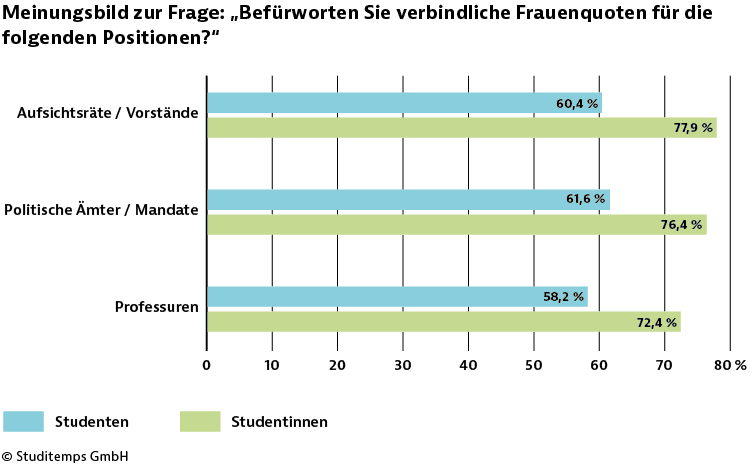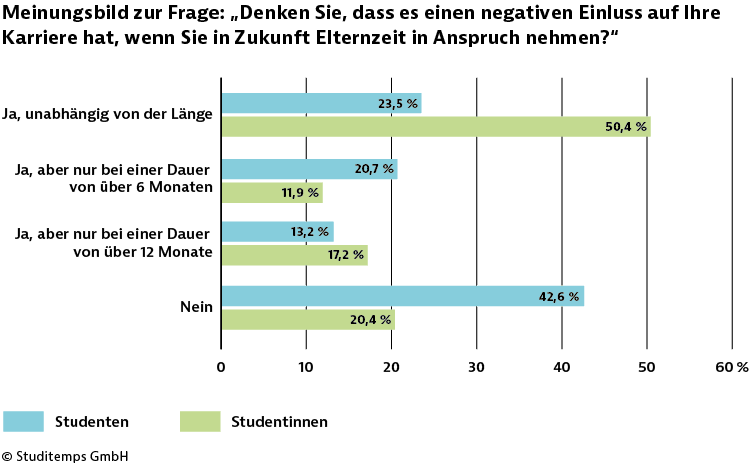Women's quota: The majority of students support a mandatory quota for women represented on supervisory/executive boards (M 60.4 percent/W 77.9 percent), holding political office/mandates (M 61.6 percent/W 76.4 percent), and acting as professors (M 58.2 percent/W 72.4 percent).
Parental leave: 57 percent of male students and almost 80 percent of female students believe that taking parental leave will have a negative impact on their career. Over half the female respondents worry about negative implications, regardless of how long they take off for parental leave – only 23.5 percent of male respondents share this concern.
Cologne, 20 August 2021. On 25 June 2021, the Bundesrat ratified the Second Act on Equal Participation of Men and Women in Management Positions (Zweites Führungspositionen-Gesetz - FüPoG II). An increased effort must be made now to include women in management positions in large companies when hiring new employees. Mandatory women’s quotas are always a contentious matter. The topic proved popular during Germany's so-called Super Election Year: For example, the CSU announced that it will enter the elections with an equal number of male and female candidates – something which has long been practised by the SPD and the Greens.
jobvalley, Germany's leading digital platform that provides flexible jobs for students and graduates, has partnered with the Department of Labour Economics at Maastricht University to take a look at the outlook among Germany's students on the topic of ‘mandatory women’s quotas’ and ‘parental leave and your career’. This special report was featured in the 18th edition of the Fachkraft 2030 series. Around 12,000 students throughout Germany were surveyed in March and April 2021.
If you cite this study, please include a link to the associated jobvalley page:
https://jobvalley.com/blog/blog/womens-quota-and-parental-leave/

‘An overwhelming majority of both female and male respondents support a mandatory women’s quota – not only for leadership positions, but also for professors and political offices and mandates. Political decision makers need to listen up and take notice. It remains to be seen whether the students’ views towards a mandatory women's quota will play a role in the upcoming federal election, namely whether they will vote for parties with an equal number of male and female candidates or call for a mandatory women’s quota. All will become clear come September.
– Petra Ehrhard, Vice President of Marketing at jobvalley
Parental leave and careers:
Another major issue that keeps popping up in relation to equal opportunities and potential discrimination at work is parental leave. According to the Federal Statistical Office, the number of parents taking parental leave increased by around one third between 2009 and 2019. However, to this day, only an extremely small percentage of fathers tend to take parental leave. In 2019, almost a quarter of all mothers whose youngest child is under 6 years old were on parental leave. Among fathers, this figure was only 1.6%. For children under 3, 42.2% of mothers and 2.6% of fathers were on parental leave.
In light of these statistics, the responses from the students came as a surprise:

‘My husband and I were both working in international positions with a large amount of travel when our daughter was born. Working part-time just wasn’t an option back then. The way people saw it at the time: If you wanted to get ahead in your career, you needed to work full-time. That was 16 years ago. Many things have changed since then, but not as much as I’d like to see, or as widespread. It's certainly a sad state of affairs. From what I’ve experienced, the concerns voiced by the students remain justified. I really hope that the young generation is met with more understanding, open-mindedness and flexibility in the future – that the discussion on new, equal, flexible work doesn’t remain a discussion, but results in action to transform the working world. Topics such as parental leave need to become a matter of course for men and women in equal measure, if desired, without leaving them concerned about negative implications on their own careers.’
– Petra Ehrhard, Vice President of Marketing at jobvalley
In general, the male respondents conveyed a surprising sense of optimism: 42.6% of the male students don’t believe taking parental leave in the future will have any negative impacts on their career. The figures could indicate two things: Perhaps they demonstrate that these male respondents represent the voice of a new, more open-minded generation. Men who are prepared to take parental leave and don’t associate it with any negative effects on their careers – we simply don’t have the empirical data to say it does – and who view parental leave as entirely normal in their companies without any fear of implications on their future career. Or: male students simply expect to take less parental leave when the time comes (or none at all), so it won’t play any role in their career.
You can download the graphs and images of Petra Ehrhard here.
About ‘Fachkraft 2030’:
The representative survey for the Fachkraft 2030 study series (formerly Fachkraft 2020) has been conducted at the start of each semester since launching in September 2012. The research project headed by the Department of Labour Economics at Maastricht University hopes to widen the academic debate on education in Germany with a range of different topics. To date, almost 350,000 individuals have participated in the nationwide surveys. Data is collected on Jobmensa, Germany’s largest job portal for student jobs operated by jobvalley.
Conducting the survey and method:
The 18th survey for the Fachkraft 2030 study series, on which this publication is based, was conducted in March and April 2021 (exact dates: 15/03 to 11/04/2021). Roughly 12,000 people took part throughout Germany. The project has been academically led by the Department of Labour Economics at Maastricht University since the first online survey in 2012. There are no systematic deviations between the German students and samples taken from the surveys specified herein. The data is correspondingly representative of the cohort. In-depth descriptions of the methodology can be found in the available complete versions of the study series. (https://jobvalley.com/fachkraft-2030/)
